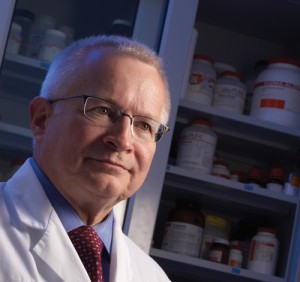2014 Honorees
Tyler Jacks, Ph.D.
Koch Institute for integrative Cancer Research at MIT
 Tyler Jacks is a Professor of Biology at the Massachusetts Institute of Technology (MIT), an Howard Hughes Medical Institute (HHMI) investigator, and director of the David H. Koch Institute for Integrative Cancer Research, which brings together biologists and engineers to improve detection, diagnosis, and treatment of cancer. Dr. Jacks pioneered the use of gene-targeting technology in mice to study cancer-associated genes and to construct mouse models of many human cancer types. His lab studies the genetic events that lead to the development of cancer. The lab focuses on using a series of mouse strains carrying engineered mutations known to be involved in human cancer. Through loss-of-function and gain-of-function mutations in tumor suppressor genes as well as the K-ras oncogene, mouse models of many types of cancer have been constructed, including pancreatic cancer, astrocytoma, endometrioid ovarian cancer, colorectal cancer, sarcoma, retinoblastoma, and tumors of the peripheral nervous system. Dr. Jacks graduated magna cum laude with Highest Honors in biology from Harvard University in 1983 and earned a Ph.D. in biochemistry from the University of California, San Francisco in 1988. Dr. Jacks then went on to do postdoctoral research at MIT in the Whitehead Institute in the lab of Robert A. Weinberg. He was named an assistant professor at MIT in 1992 and associate professor with tenure in 1997. In 2000, he was promoted to full professor standing. Tyler Jacks served on the Board of Scientific Advisors of the National Cancer Institute and is a past president of the American Association of Cancer Research. He also sits on the board of directors at Thermo Fisher Scientific, Inc. and Aveo Pharmaceuticals Inc. He is a member of the Scientific Advisory Board at T2Biosystems, Inc. and at Epizyme, Inc. Dr. Jacks was elected to the National Academy of Science in 2009.
Tyler Jacks is a Professor of Biology at the Massachusetts Institute of Technology (MIT), an Howard Hughes Medical Institute (HHMI) investigator, and director of the David H. Koch Institute for Integrative Cancer Research, which brings together biologists and engineers to improve detection, diagnosis, and treatment of cancer. Dr. Jacks pioneered the use of gene-targeting technology in mice to study cancer-associated genes and to construct mouse models of many human cancer types. His lab studies the genetic events that lead to the development of cancer. The lab focuses on using a series of mouse strains carrying engineered mutations known to be involved in human cancer. Through loss-of-function and gain-of-function mutations in tumor suppressor genes as well as the K-ras oncogene, mouse models of many types of cancer have been constructed, including pancreatic cancer, astrocytoma, endometrioid ovarian cancer, colorectal cancer, sarcoma, retinoblastoma, and tumors of the peripheral nervous system. Dr. Jacks graduated magna cum laude with Highest Honors in biology from Harvard University in 1983 and earned a Ph.D. in biochemistry from the University of California, San Francisco in 1988. Dr. Jacks then went on to do postdoctoral research at MIT in the Whitehead Institute in the lab of Robert A. Weinberg. He was named an assistant professor at MIT in 1992 and associate professor with tenure in 1997. In 2000, he was promoted to full professor standing. Tyler Jacks served on the Board of Scientific Advisors of the National Cancer Institute and is a past president of the American Association of Cancer Research. He also sits on the board of directors at Thermo Fisher Scientific, Inc. and Aveo Pharmaceuticals Inc. He is a member of the Scientific Advisory Board at T2Biosystems, Inc. and at Epizyme, Inc. Dr. Jacks was elected to the National Academy of Science in 2009.
Tyler Jacks’ Acceptance Remarks
Charles L. Sawyers, M.D.
Memorial Sloan-Kettering Cancer Center
 Charles Sawyers is an investigator of the HHMI and a physician-scientist at Memorial Sloan-Kettering Cancer Center. His lab builds on the success of molecularly targeted cancer drugs with a focus on developing a new generation of treatment options for patients. Dr. Sawyers holds the Marie-Josée and Henry R. Kravis Chair in Human Oncology and Pathogenesis Program. Dr. Sawyers is the recipient of numerous awards, including the 2013 Breakthrough Prize in Life Sciences and the 2009 Lasker Clinical Award, which recognized him for his part in advancing treatments for chronic myeloid leukemia (CML). He played a key role in the development of imatinib (Gleevec) and dasatinib (Sprycel), two drugs that together have transformed CML from a fatal cancer into one that is nearly always treatable. Imatinib was approved by the US Food and Drug Administration in 2001, and dasatinib was approved in 2006. Using his clinical understanding of treating CML as well his expertise from studying it in the laboratory, Dr. Sawyers helped design the first clinical trial for imatinib, including selecting which patients were most likely to benefit from the drug. Along with Brian J. Druker of Oregon Health and Science University and Moshe Talpaz of The University of Texas M.D. Anderson Cancer Center. His more recent work resulted in the discovery of the prostate cancer drug enzalutamide that received FDA approval in 2012. Prior to Memorial Sloan-Kettering, Sawyers worked at UCLA’s Jonsson Cancer Center for nearly 18 years. He has a Bachelors Degree in history from Princeton University and an M.D. from Johns Hopkins University.
Charles Sawyers is an investigator of the HHMI and a physician-scientist at Memorial Sloan-Kettering Cancer Center. His lab builds on the success of molecularly targeted cancer drugs with a focus on developing a new generation of treatment options for patients. Dr. Sawyers holds the Marie-Josée and Henry R. Kravis Chair in Human Oncology and Pathogenesis Program. Dr. Sawyers is the recipient of numerous awards, including the 2013 Breakthrough Prize in Life Sciences and the 2009 Lasker Clinical Award, which recognized him for his part in advancing treatments for chronic myeloid leukemia (CML). He played a key role in the development of imatinib (Gleevec) and dasatinib (Sprycel), two drugs that together have transformed CML from a fatal cancer into one that is nearly always treatable. Imatinib was approved by the US Food and Drug Administration in 2001, and dasatinib was approved in 2006. Using his clinical understanding of treating CML as well his expertise from studying it in the laboratory, Dr. Sawyers helped design the first clinical trial for imatinib, including selecting which patients were most likely to benefit from the drug. Along with Brian J. Druker of Oregon Health and Science University and Moshe Talpaz of The University of Texas M.D. Anderson Cancer Center. His more recent work resulted in the discovery of the prostate cancer drug enzalutamide that received FDA approval in 2012. Prior to Memorial Sloan-Kettering, Sawyers worked at UCLA’s Jonsson Cancer Center for nearly 18 years. He has a Bachelors Degree in history from Princeton University and an M.D. from Johns Hopkins University.
Charles Sawyers’ Acceptance Remarks
Daniel D. Von Hoff, M.D., F.A.C.P.
Translational Genomics Research Institute
 Dan Von Hoff, M.D., is a medical oncologist and oncology drug developer. Dr. Von Hoff’s major interest is in the development of new anticancer agents. Dr. Von Hoff and his colleagues have conducted early clinical investigations of many new cancer agents including gemcitabine, docetaxel, paclitaxel, topotecan, irinotecan, fludarabine, mitoxantrone, dexrazoxane, nab-paclitaxel, vismodegib, and others. At present, he and his colleagues are concentrating on the development of molecularly targeted therapies for individual patients with cancer. His other major accomplishment is the development of two specific treatments which have improved the survival for patients with advanced pancreatic cancer. Dr. Von Hoff is Physician-in-Chief and Distinguished Professor of the Translational Genomics Research Institute (TGen); Professor of Medicine at both Mayo Clinic, Scottsdale and the University of Arizona College of Medicine; and Chief Scientific Officer at Scottsdale Healthcare and US Oncology. Dr. Von Hoff graduated cum laude from Carroll University, and received his M.D. from Columbia University College of Physicians and Surgeons. He completed his internship and residency in internal medicine at the University of California, San Francisco, then completed a medical oncology fellowship at the National Cancer Institute. Dr. Von Hoff most recently served a six-year term on President Bush’s National Cancer Advisory Board (June 2004 – March 2010) and has served on the FDA’s Oncology Advisory Committee. He is the past President of the American Association for Cancer Research the world’s largest cancer research organization, a Fellow of the American College of Physicians, and a member and past board member of the American Society of Clinical Oncology.
Dan Von Hoff, M.D., is a medical oncologist and oncology drug developer. Dr. Von Hoff’s major interest is in the development of new anticancer agents. Dr. Von Hoff and his colleagues have conducted early clinical investigations of many new cancer agents including gemcitabine, docetaxel, paclitaxel, topotecan, irinotecan, fludarabine, mitoxantrone, dexrazoxane, nab-paclitaxel, vismodegib, and others. At present, he and his colleagues are concentrating on the development of molecularly targeted therapies for individual patients with cancer. His other major accomplishment is the development of two specific treatments which have improved the survival for patients with advanced pancreatic cancer. Dr. Von Hoff is Physician-in-Chief and Distinguished Professor of the Translational Genomics Research Institute (TGen); Professor of Medicine at both Mayo Clinic, Scottsdale and the University of Arizona College of Medicine; and Chief Scientific Officer at Scottsdale Healthcare and US Oncology. Dr. Von Hoff graduated cum laude from Carroll University, and received his M.D. from Columbia University College of Physicians and Surgeons. He completed his internship and residency in internal medicine at the University of California, San Francisco, then completed a medical oncology fellowship at the National Cancer Institute. Dr. Von Hoff most recently served a six-year term on President Bush’s National Cancer Advisory Board (June 2004 – March 2010) and has served on the FDA’s Oncology Advisory Committee. He is the past President of the American Association for Cancer Research the world’s largest cancer research organization, a Fellow of the American College of Physicians, and a member and past board member of the American Society of Clinical Oncology.
Daniel Von Hoff’s Acceptance Remarks
Jan T. Vilcek, M.D., Ph.D.
Vilcek Foundation
 Jan Vilček M.D., Ph.D. is a biomedical scientist, educator, inventor and philanthropist. He is currently a professor in the Department of Microbiology at the New York University School of Medicine and President of The Vilcek Foundation. Dr. Vilček, a native of Bratislava, Slovakia, (formerly Czechoslovakia) received his M.D. degree from Comenius University Medical School, Bratislava, Czechoslovakia in 1957; and his Ph.D. in Virology from the Institute of Virology, Czechoslovak Academy of Sciences, Bratislava, Czechoslovakia in 1962. In 1964, Jan Vilček, with his wife Marica, defected from Communist Czechoslovakia during a three-day visit to Vienna. In 1965, the Vilčeks immigrated to the United States, and have since lived in New York City. Vilček devoted his scientific career to studies of soluble mediators that regulate the immune system (cytokines, including interferon and tumor necrosis factor (TNF). In 1989 Vilček and NYU colleague, Junming Le, created a monoclonal antibody against TNF-alpha, a powerful promoter of inflammation.Collaborating with the biotechnology company Centocor (later acquired by Johnson & Johnson and recently renamed Janssen Biotech, Inc.), Vilček and Le helped to develop the biologic drug Remicade. With the royalties from the sales of Remicade, Jan and Marica have funded numerous programs at NYU School of Medicine and they established the Vilcek Foundation in 2000, which helps fulfills its mission by awarding annual Vilcek Prizes in biomedical science, as well as the arts. In 2013 Dr. Vilcek received the National Medal of Technology and Innovation.
Jan Vilček M.D., Ph.D. is a biomedical scientist, educator, inventor and philanthropist. He is currently a professor in the Department of Microbiology at the New York University School of Medicine and President of The Vilcek Foundation. Dr. Vilček, a native of Bratislava, Slovakia, (formerly Czechoslovakia) received his M.D. degree from Comenius University Medical School, Bratislava, Czechoslovakia in 1957; and his Ph.D. in Virology from the Institute of Virology, Czechoslovak Academy of Sciences, Bratislava, Czechoslovakia in 1962. In 1964, Jan Vilček, with his wife Marica, defected from Communist Czechoslovakia during a three-day visit to Vienna. In 1965, the Vilčeks immigrated to the United States, and have since lived in New York City. Vilček devoted his scientific career to studies of soluble mediators that regulate the immune system (cytokines, including interferon and tumor necrosis factor (TNF). In 1989 Vilček and NYU colleague, Junming Le, created a monoclonal antibody against TNF-alpha, a powerful promoter of inflammation.Collaborating with the biotechnology company Centocor (later acquired by Johnson & Johnson and recently renamed Janssen Biotech, Inc.), Vilček and Le helped to develop the biologic drug Remicade. With the royalties from the sales of Remicade, Jan and Marica have funded numerous programs at NYU School of Medicine and they established the Vilcek Foundation in 2000, which helps fulfills its mission by awarding annual Vilcek Prizes in biomedical science, as well as the arts. In 2013 Dr. Vilcek received the National Medal of Technology and Innovation.